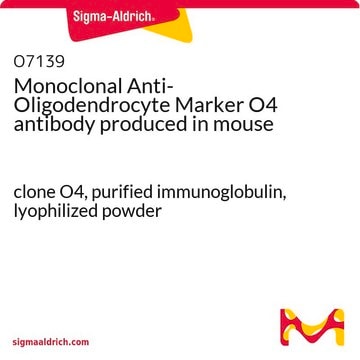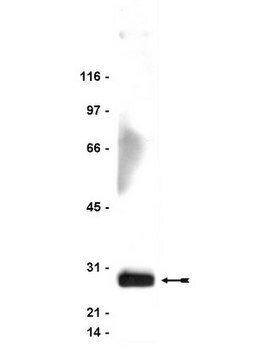03-196
RIPAb+ EED - RIP Validated Antibody and Primer Set
purified antibody, from mouse
Synonym(s):
WD protein associating with integrin cytoplasmic tails 1, embryonic ectoderm development
Sign Into View Organizational & Contract Pricing
All Photos(4)
About This Item
UNSPSC Code:
12352203
eCl@ss:
32160702
NACRES:
NA.32
Recommended Products
biological source
mouse
Quality Level
antibody form
purified antibody
clone
monoclonal
species reactivity
human, mouse
manufacturer/tradename
RIPAb+
Upstate®
technique(s)
RIP: suitable
immunoprecipitation (IP): suitable
western blot: suitable
isotype
IgG2aκ
NCBI accession no.
UniProt accession no.
shipped in
dry ice
General description
Polycomb group proteins are important for maintaining transcriptional silencing. One conserved PcG complex, PRC2, is composed of several proteins including the histone methyltransferase EZH2, the WD-repeat protein EED (Embryonic ectoderm development), and the Zn-finger protein Suz12. Transcriptional repression mediated by EED involves histone deacetylation, while the EZH2 methylates histone H3 on lysine 27. EED protein is present in four isoforms. These EED isoforms selectively associate with distinct EZH2-containing complexes, resulting in differential targeting of their associated methyltransferase activity. These complexes play a role in Hox gene silencing, X-inactivation, germline development, stem cell pluripotency and cancer metastasis.
Specificity
Not tested in other species.
This antibody recognizes mouse EED, (~30-65 kDa).
Immunogen
Recombinant fusion protein of full length murine EED tagged with MBP.
Application
Immunoprecipitation from RIP lysate:
Representative lot data.
RIP lysate from HeLa cells (~2 X 10E7 cell equivalents per IP) was subjected to immunoprecipitation using 5 µg of either a normal mouse IgG, (Cat. #CS200621), or 5 µg of Anti-EED antibody (Cat. # CS204372). Ten percent of the precipitated proteins (lane 1: mouse IgG, lane 3: EED) and HeLa whole cell lysate (lane 2) were resolved by electrophoresis, transferred to nitrocellulose and probed with Anti-EED antibody (Cat. # CS204372, 1:5000). Proteins were visualized using One-Step IP-Western kit (GenScript Cat. # L00232).
Arrow indicates EED.
Western Blot Analysis:
Representative lot data.
A431 cell lysate was resolved by electrophoresis, transferred to nitrocellulose and probed with Anti-EED (1:5,000 dilution). Proteins were visualized using a goat anti-mouse IgG conjugated to HRP and a chemiluminescence detection system.
Arrow indicates EED (~50 kDa).
Representative lot data.
RIP lysate from HeLa cells (~2 X 10E7 cell equivalents per IP) was subjected to immunoprecipitation using 5 µg of either a normal mouse IgG, (Cat. #CS200621), or 5 µg of Anti-EED antibody (Cat. # CS204372). Ten percent of the precipitated proteins (lane 1: mouse IgG, lane 3: EED) and HeLa whole cell lysate (lane 2) were resolved by electrophoresis, transferred to nitrocellulose and probed with Anti-EED antibody (Cat. # CS204372, 1:5000). Proteins were visualized using One-Step IP-Western kit (GenScript Cat. # L00232).
Arrow indicates EED.
Western Blot Analysis:
Representative lot data.
A431 cell lysate was resolved by electrophoresis, transferred to nitrocellulose and probed with Anti-EED (1:5,000 dilution). Proteins were visualized using a goat anti-mouse IgG conjugated to HRP and a chemiluminescence detection system.
Arrow indicates EED (~50 kDa).
Research Category
Epigenetics & Nuclear Function
Apoptosis & Cancer
Epigenetics & Nuclear Function
Apoptosis & Cancer
Research Sub Category
Chromatin Biology
Chromatin Biology
This RIPAb+ EED -RIP Validated Antibody & Primer Set conveniently includes the antibody & the specific control PCR primers.
Packaging
10 assays per set. Recommended use: ~5 μg of antibody per RIP (dependent upon biological context).
Quality
RNA Binding Protein Immunoprecipitation: Representative lot data.
RIP Lysate prepared from HeLa cells (2 X 10E7 cell equivalents per IP) were subjected to immunoprecipitation using 5 µg of either a normal mouse IgG or 5 µg of Anti-EED antibody and the Magna RIP® RNA-Binding Protein Immunoprecipitation Kit (Cat. # 17-700).
Successful immunoprecipitation of EED-associated RNA was verified by qPCR using RIP Primers lincSFPQ.
Please refer to the Magna RIP (Cat. # 17-700) or EZ-Magna RIP (Cat. # 17-701) protocol for experimental details.
RIP Lysate prepared from HeLa cells (2 X 10E7 cell equivalents per IP) were subjected to immunoprecipitation using 5 µg of either a normal mouse IgG or 5 µg of Anti-EED antibody and the Magna RIP® RNA-Binding Protein Immunoprecipitation Kit (Cat. # 17-700).
Successful immunoprecipitation of EED-associated RNA was verified by qPCR using RIP Primers lincSFPQ.
Please refer to the Magna RIP (Cat. # 17-700) or EZ-Magna RIP (Cat. # 17-701) protocol for experimental details.
Target description
Ranges from 30-65 kDa (5-6 isoforms of EED are detected).
Physical form
Anti-EED (Mouse Monoclonal). One vial containing 50 μg of protein G purified antibody in 65 μL of 0.1 M Tris-Glycine (pH7.4) 150 mM NaCl, containing 0.05% azide before the addition of 30% glycerol. Store at -20°C .
Normal Mouse IgG. One vial containing 125 µg of purified mouse IgG in 125 µL of storage buffer containing 0.1% sodium azide. Store at -20°C.
RIP Primers, lincSFPQ.
One vial containing 75 μL of 5 μM of each primer specific for the human lincRNA SFPQ. Store at -20°C.
FOR: TCG TAC TGT TAG GCC CTT GG
REV: AAC CTT GCA TGA AGA GCA CC
Normal Mouse IgG. One vial containing 125 µg of purified mouse IgG in 125 µL of storage buffer containing 0.1% sodium azide. Store at -20°C.
RIP Primers, lincSFPQ.
One vial containing 75 μL of 5 μM of each primer specific for the human lincRNA SFPQ. Store at -20°C.
FOR: TCG TAC TGT TAG GCC CTT GG
REV: AAC CTT GCA TGA AGA GCA CC
Protein G Purified
Storage and Stability
Stable for 1 year at -20°C from date of receipt.
Handling Recommendations: Upon receipt, and prior to removing the cap, centrifuge the vial and gently mix the solution. Aliquot into microcentrifuge tubes and store at -20°C. Avoid repeated freeze/thaw cycles, which may damage IgG and affect product performance. Note: Variabillity in freezer temperatures below -20°C may cause glycerol containing solutions to become frozen during storage.
Handling Recommendations: Upon receipt, and prior to removing the cap, centrifuge the vial and gently mix the solution. Aliquot into microcentrifuge tubes and store at -20°C. Avoid repeated freeze/thaw cycles, which may damage IgG and affect product performance. Note: Variabillity in freezer temperatures below -20°C may cause glycerol containing solutions to become frozen during storage.
Analysis Note
Control
Includes negative control normal mouse IgG antibody and control primers specific for the cDNA of human lincRNA SFPQ.
Includes negative control normal mouse IgG antibody and control primers specific for the cDNA of human lincRNA SFPQ.
Other Notes
Concentration: Please refer to the Certificate of Analysis for the lot-specific concentration.
Legal Information
MAGNA RIP is a registered trademark of Merck KGaA, Darmstadt, Germany
UPSTATE is a registered trademark of Merck KGaA, Darmstadt, Germany
Disclaimer
Unless otherwise stated in our catalog or other company documentation accompanying the product(s), our products are intended for research use only and are not to be used for any other purpose, which includes but is not limited to, unauthorized commercial uses, in vitro diagnostic uses, ex vivo or in vivo therapeutic uses or any type of consumption or application to humans or animals.
Storage Class
10 - Combustible liquids
Certificates of Analysis (COA)
Search for Certificates of Analysis (COA) by entering the products Lot/Batch Number. Lot and Batch Numbers can be found on a product’s label following the words ‘Lot’ or ‘Batch’.
Already Own This Product?
Find documentation for the products that you have recently purchased in the Document Library.
Nadine Hosny El Said et al.
Cell death & disease, 12(10), 850-850 (2021-09-18)
PRC2-mediated epigenetic function involves the interaction with long non-coding RNAs (lncRNAs). Although the identity of some of these RNAs has been elucidated in the context of developmental programs, their counterparts in postmitotic adult tissue homeostasis remain uncharacterized. To this aim
Bolin Chen et al.
OncoTargets and therapy, 14, 637-651 (2021-02-02)
Novel inhibitor of histone acetyltransferase repressor (NIR), a corepressor with a novel inhibitor of histone acetyltransferase (INHAT) activity, has been reported to be a negative modulator of p53 and a regulator of the cell cycle in cancer cells. However, the
Alu elements in ANRIL non-coding RNA at chromosome 9p21 modulate atherogenic cell functions through trans-regulation of gene networks.
Holdt, LM; Hoffmann, S; Sass, K; Langenberger, D; Scholz, M; Krohn, K; Finstermeier et al.
PLoS Genetics null
Our team of scientists has experience in all areas of research including Life Science, Material Science, Chemical Synthesis, Chromatography, Analytical and many others.
Contact Technical Service








